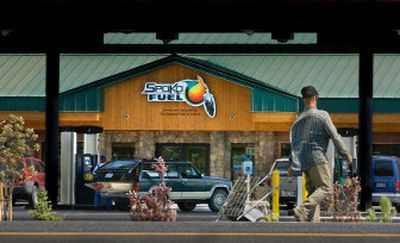Tribes reach gas tax deal

OLYMPIA – In a deal stirring interest on reservations across the state, two Western Washington Indian tribes have agreed to charge a tribal motor vehicle fuel tax – and to split the money with state government.
Under the deals, the Squaxin Island and Swinomish tribes agree that their tribal-run reservation gas stations will charge the same 34-cents-a-gallon fuel tax that the state charges at non-tribal stations.
The tribes get 75 percent, the state 25 percent. Under the agreements, the two tribes must spend their share – an estimated $500,000 a year – on transportation.
“This is, in my mind, a win-win both for the tribes and the state and anybody who drives, either on- or off-reservation,” said Kelly Croman, an attorney for the Squaxin Island tribe near Olympia.
Less enthusiastic was Barb Lindsay, executive director of One Nation United, a Redmond-based group pushing for tighter federal policies regarding tribes. She predicts that virtually all of the state’s other 27 tribes will want similar agreements.
“I don’t think that the state of Washington can afford to lose the millions and millions of dollars that are at stake if more tribes follow,” she said.
Since tribes aren’t subject to state public-disclosure laws, Lindsay said she’s also skeptical that the state can ensure the money’s spent on transportation.
“Tribal books are virtually a black hole,” she said.
It’s unclear how much money is at stake. State Rep. Bev Woods said state analysts told her that if the other tribes strike similar deals, the state will lose from $118 million to $500 million a year in tax dollars.
“We’re not talking small change here,” said Woods, R-Poulsbo.
With the case still on appeal, Woods thinks the governor’s office was too quick to make the agreements. And she worries about the 75 percent/25 percent precedent.
“If the tribes are in need of work on their roads, we can work out some kind of agreement without giving the whole store away,” she said.
The agreements were spurred by a U.S. District Court ruling. Judge Thomas Zilly said in February that the state couldn’t force the tribal-run stations to collect state fuel tax. (Privately owned gas stations, even those on reservations, still must collect the state tax from non-tribal buyers.)
Under that ruling, the two tribes could have kept 100 percent of the tax money. Or they could have simply not charged any tax at all. That would have given them an instant 34-cent price advantage over any non-tribal competitor.
But the tribes felt that it made better sense to hash out a deal with the state, Croman said. “The intent is to get a tax base, not to sell cheap gas,” she said.
The tribe has bridges and roads to fix, a transit system serving 30,000 riders a year, and police to enforce traffic laws.
For now, she said, the Squaxins are combining their fuel tax money with federal grants to replace a 70-year-old county bridge and rebuild a public boat launch. Neither project is on the tribe’s 1,500-acre reservation.
“A lot of Indian and non-Indian people drive on that bridge all the time,” said Croman.
Indian reservations are often a patchwork of state, county and tribal roads, she said. Federal grants are available to fix those roads, she said, but the tribes often have to come up with matching money. The new tax gives tribes a way to do that.
Although many tribes have found unprecedented commercial success running casinos, they have few options for a steady, long-term tax base to support their governments. Most tribes can’t have a property tax because much reservation land is held in trust by the federal government, and tribes cannot tax the feds. As for a tribal income tax, “You’re just going to drive your tribal members off the reservation if you impose an income tax in a state that doesn’t have one,” Croman said. The same, she said, is true of a tribal sales or business tax. Casinos and other tribal business ventures support many Indian governments, but tribal leaders across the country have for years expressed public concerns about the longevity of their gambling profits.
Michael Marchand, chairman of the business council for the Confederated Tribes of the Colville Reservation, said that the Colvilles might be interested in a similar gas tax agreement with the state. The tribe runs two fuel stations, one in Nespelem and one in Keller.
“I think we’re interested in all the possibilities,” Marchand said. “Taxation is a problem for tribes. We need infrastructure and roads just like everyone else.”
Under an existing agreement, according to the state Department of Licensing, the tribe is one of 13 that collect state fuel tax now. But it gets a refund – $872,000 last year – of the tax from fuel sales to tribal members.
Several tribes have expressed interest in new fuel tax agreements, according to Gov. Chris Gregoire’s chief of staff, Tom Fitzsimmons. But the state’s not ready to negotiate yet, he said. For one thing, it’s appealing Zilly’s court ruling. And Fitzsimmons said the governor wants to give state lawmakers a chance to modify Washington’s tax law when the legislative session starts in January.
At the request of the state Transportation and Licensing departments, the state Senate in February passed a bill intended to end-run the federal court case. Instead of arguing about whether state tax applied on reservations, Senate Bill 6785 would have explicitly taxed the fuel before it ever got to Indian land. Fuel blenders and importers would have collected the tax, instead of gas stations.
But as the Squaxins quickly pointed out, tribes can set up fuel blending plants on reservations, too. And if they did, Croman said, they could “potentially sell tax-exempt gas far beyond the reaches of their reservation.”
The bill died in the House of Representatives. And now that the tribe has a tax deal with the state, Croman said, the Squaxins’ interest in setting up their own fuel-blending operation has waned.